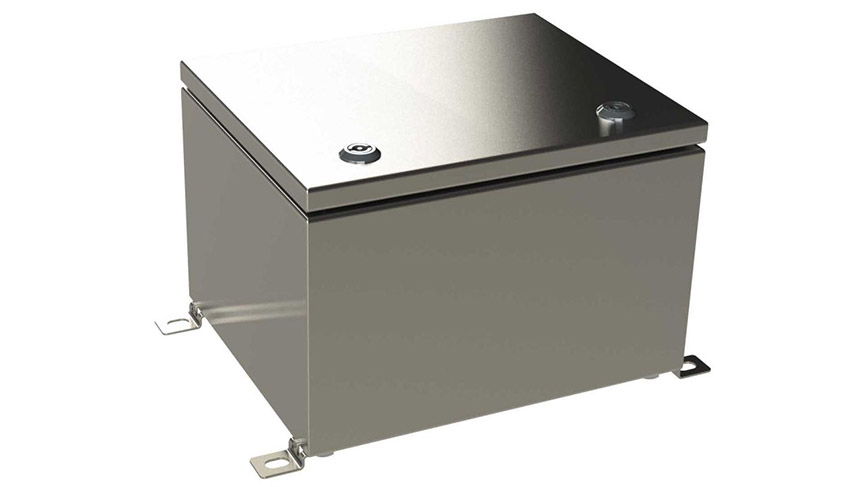- URL
Share
One digit can make a lot of difference. Whether it’s a bank account number, a test score, or a stock price, one changed digit can produce entirely different results. But when it comes to the question of IP65 vs. IP66 electronics enclosures, what difference does the change of one digit signify?
In many ways, IP65 enclosures and IP66 enclosures are more alike than they are different. But the difference is still present, and it manifests itself in several important ways. In this article, we’ll examine the ways in which IP65 and IP66 enclosures are similar and dissimilar, including the protective qualities that you can expect from each rating.

Source: Dmitry Kalinovsky/Shutterstock
Introduction to IP Ratings
IP ratings are a system of electrical enclosure ratings based on the IEC 60529 standard that specify the protective qualities of an enclosure. An IP rating is a two-digit number in which each digit represents the level of protection that the enclosure offers against environmental hazards.
The IP rating system works as follows:
- First Digit: The first digit specifies the enclosure’s protection against solid ingress (i.e. dust, objects, airborne debris, etc.).
- Second Digit: The second digit specifies the enclosure’s protection against water ingress.
Using this system, an enclosure buyer can be confident that their enclosure meets certain protective standards. For more detailed information on the IP rating system, see Polycase's guide to IP ratings.
The IP65 Rating
IP65 ratings have the following protective qualities:
- Completely dust-tight (no ingress of dust, objects or airborne debris permitted)
- Protected against splashing, falling, or dripping water
- Protected against hose-directed water, from any direction, using a nozzle of 6.33 mm or smaller at relatively low pressures
IP65 enclosures offer solid and reliable protection, and they’re used for many different indoor and outdoor applications.
The IP66 Rating
IP66 ratings have the following protective qualities:
- Completely dust-tight (no ingress of dust, objects, or airborne debris permitted)
- Protects against splashing, falling, or dripping water
- Protects against hose-directed water, from any direction, using a nozzle of 12.5 mm or smaller at higher pressures
IP66 is the highest level of waterproof protection for an IP rated enclosure except for enclosures designed to survive total submersion (such as IP68 enclosures).

Source: Parilov/Shutterstock
IP65 vs. IP66: Which Do You Need?
Which is appropriate for your application, an IP65 or IP66 enclosure? The answer depends on the application that you’ll use the enclosure for.
Both IP65 and IP66 ratings provide excellent protection against solid ingress from dust, dirt, and debris. The main difference between IP65 and IP66 ratings is their level of protection against liquid ingress. An IP66 enclosure can handle a significantly higher level of pressurized water spray, from larger nozzles and at higher kPa ratings.
Thus, the main question you should ask when choosing between IP65 and IP66 enclosures is whether your device will encounter jets of high-pressure water. If your device needs protection against high-pressure water jets, an IP66 enclosure is likely the correct choice. But if your device is unlikely to encounter pressurized water spray, considering IP65 enclosures as an option can give you more choices in your search for the right enclosure.
IP65 and IP66 Rated Enclosures
Polycase offers a full selection of enclosures with IP65 and IP66 ratings. Whether you need an IP65 or IP66 enclosure, our selection of electrical and electronics enclosures offers the performance that will keep your devices safe.
Our most popular IP65 and IP66 rated enclosures include:
- Polycase WA Series (IP65): The WA Series offers a cost-effective enclosure solution that’s perfect for indoor applications. Their ABS plastic construction and silicone gasket combine to create reliable IP65 rated protection for your most important devices.
- Polycase ML Series (IP65 and IP66): The ML Series are among our leading models of outdoor electrical enclosure and make an excellent choice for a waterproof junction box. These models are made from ultra-durable polycarbonate and offer a clear polycarbonate cover option for easy access to data readouts.
- Polycase SG Series (IP65 and IP66): Our SG Series models are rugged polycarbonate outdoor enclosures that come in a wide range of sizes and feature both IP65 and IP66 rated enclosures. Available with many useful optional accessories such as surface mounting panels, cable glands, and more.
- Polycase SA Series (IP66): One of our most durable IP66 enclosure series, the SA Series are crafted from 304 stainless steel for unbeatable toughness and corrosion resistance. Their IP66 rating and natural anti-corrosion properties make them an ideal weatherproof enclosure suitable for many different outdoor applications.

Polycase SA-32 Stainless Steel Enclosure
Polycase’s enclosure experts are glad to assist if you need more help choosing between IP65 vs. IP66 enclosures. Just call us at 1-800-248-1233 or contact us online for more information. Or, if you’re interested in exploring other enclosure ratings, see our IP65 vs. IP67 enclosure guide or our NEMA 4 vs. IP65 enclosure guide.
0 Comment
